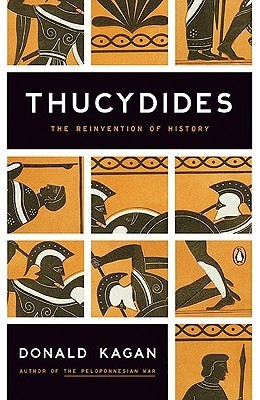Thucydides: the Reinvention of History by Donald Kagan
New York: Penguin Books, 2010 ISBN 9780143118299
A great book. The modern doyen of the history of the Peloponnesian War, Donald Kagan, in deep reflection on the history, and the historian, of that war Thucydides. Famously the "inventor" of the modern idea of history, Kagan shows us that Thucydides was not the dispassionate, apolitical chronicler of events that he claimed to be, but was actually engaged through his work in a revisionist interpretation of what, for him and his countrymen, was recent history.
Kagan has studied not only Thucydides' text but all the other historical artefacts that help explain what went on during the time of the Peloponnesian War, and has come to the conclusion that Thucydides' project was to change the accepted view of why the war played out as it did: to put forward his own views which, Kagan states, differed from the accepted view of the time.
By no means does Kagan suggest that Thucydides was a mere polemicist: in fact he points out that much of the evidence he uses in this book to contradict Thucydides' view actually comes from Thucydides' text. What Kagan is suggesting is that Thucydides wished to use his history to make certain points: that the democratic system in place in Athens during the time of the War was flawed, and that the passion of mob whipped up by demagogues is dangerous. While he recognizes the drawbacks of oligarchic rule, he longs for a wise leader such as Pericles. We probably shouldn't be too surprised about this attitude, as Thucydides was himself an aristocrat. Pericles is the hero, as is Nicias, while Cleon and to a lesser extent Alcibiades are the villains in Thucydides' rendition of events.
Kagan, by focusing on some key events - the causes of the War, Pericles' strategy, whether Athens was actually a democracy, Cleon's victory at Pylos and defeat at Amphipolis and the Sicilian Expedition - dissects Thucydides' account and shows us that he wasn't giving his readers the full story, but only what he wanted to emphasize.
On the causes of the War, Thucydides feels that it was inevitable, as Athens' power grew and its quest for empire became greater and greater. Kagan points out that the War was not in fact inevitable, but came through a series of misunderstandings and provocations that needn't have occurred. While Thucydides bemoans Athens ditching the strategy of Pericles to wait out Sparta, Kagan shows fairly conclusively that this strategy was doomed to fail on all fronts, including economically. He also shows us that Thucydides must have known this, but by only recording one side of the argument he avoids the obvious conclusion. Thucydides uses this "trick" again when discussing Pylos, Amphipolis and the Sicilian Expedition: he emphasizes his version of events while downplaying or avoiding alternate narratives altogether.
It is the story of the Sicilian Expedition where Thucydides' interpretation of events is the most confusing. Kagan, using the evidence provided by Thucydides, convincingly argues that the failure of the expedition can be sheeted home almost exclusively to the actions (or lack of action) of Nicias. He repeatedly made tactical and strategic errors, and certainly seemed to value his own reputation and life over what was best for Athens and the troops under his command. Thucydides provides copious evidence for this point of view, but then comes to the conclusion that it was not Nicias at fault, but the Athenians themselves. Truly confounding.
What Kagan posits, I think acceptably, is that Athens was very democratic, and by no means monolithic in its outlook. Neither Pericles nor Cleon could get their own way by merely wishing it to be so - they had to have support from the Athenian citizens for their strategies. If Cleon was a demagogue, then so too was Pericles. That most of us don't think that is a testament to the power of Thucydides' work, which Kagan acknowledges.
What Kagan does in this work is to remind all of us that one should never necessarily take one person's view on why history happened the way it did as the only truth. We need to balance all the evidence to come to a conclusion. Thucydides claimed to give the unvarnished truth, but like all of us he had a barrow to push, and Kagan very skillfully teases that out in this book. A great read.
Cheers for now, from
A View Over the Bell

No comments:
Post a Comment